
Pune has recorded its first case of a pregnant woman infected with the Zika virus. The 28-year-old woman from Erandwane, who is six months pregnant, did not exhibit any symptoms of the infection. This brings the total number of Zika cases in the city to five.
Table of Content:-
To address these urgent risks, the health department has elevated its surveillance in Erandwane and Mundhwa, where previous Zika cases have been reported. The Pune Municipal Corporation (PMC) has been directed to start screening all pregnant women within a five-kilometre radius of Erandwane.
Dr Rajesh Dighe, Assistant Medical Officer of Health, Pune Municipal Corporation said that they are monitoring the pregnant woman. She is currently seeing her obstetrician and is scheduled for an ultrasound exam. An ultrasound from the last week of May showed normal foetal growth.
What Is Zika Virus?

According to Johns Hopkins Medicine, Zika is an infectious disease caused by a virus transmitted by mosquitoes, including the Aedes aegypti and Aedes albopictus species. The infection, often termed Zika fever, is usually mild and tends to resolve itself. However, the virus poses a significant risk to pregnant women and their foetuses.
Also Read: What Is Zika Virus? Know The Symptoms, Causes, Treatment, And Prevention
Symptoms Of Zika Virus

According to the World Health Organization (WHO), most people infected with the Zika virus do not experience symptoms. For those who do, symptoms usually appear 3-14 days after infection and are generally mild. Some of the common symptoms include:
- Rash
- Fever
- Conjunctivitis
- Muscle and joint pain
- Malaise
- Headache
Impact Of Zika Virus On Mother And Baby During Pregnancy

According to WHO, Zika virus infection during pregnancy can result in microcephaly (a condition where a baby's head is significantly smaller than expected) and other congenital malformations in infants, such as limb contractures and hearing loss.
Dr Sonam Simpatwar, MBBS, Diploma in OBGY (DGO), MS, Dr Babasaheb Ambedkar Memorial Railway Hospital, Byculla, Mumbai, said, "The Zika virus can be transmitted from a pregnant woman to her foetus through the placenta. This vertical transmission can happen at any stage of pregnancy, but the risk and severity of birth defects are greater if the infection occurs during the first trimester."
"Asymptomatic infections make the situation more complex since the absence of symptoms does not eliminate the risk to the foetus. Pregnant women living in or travelling to Zika-affected areas should have regular screenings and ultrasounds to ensure proper foetal development," added Dr Simpatwar.
"Zika virus infection during pregnancy can raise the risk of miscarriage and stillbirth. While the exact mechanisms are not entirely understood, it is believed that the virus may damage the placenta or disrupt blood flow to the foetus, which can lead to these unfortunate outcomes," Dr Simpatwar explained. Pregnant women with Zika should receive comprehensive prenatal care to monitor and manage these risks.
Also Read: Zika Virus During Pregnancy: Here Are 7 Things That You Should Know
How Can Zika Be Prevented?

According to the European Centre for Disease Prevention Control, to protect against the Zika virus, focus on preventing mosquito bites, especially from sunrise to sunset:
- Use mosquito repellent as directed
- Wear long-sleeved shirts and long trousers
- Stay in screened or air-conditioned rooms
- Use mosquito nets
Other Measures
- Use condoms both during and for a minimum of eight weeks after staying in an area where Zika is actively transmitted. If symptoms are present, use condoms for six months after symptoms end.
- Avoid blood donation for 28 days after returning from Zika-affected areas.
[Disclaimer: This article contains information provided by an expert and is for informational purposes only. Hence, we advise you to consult your own professional if you are dealing with any health issues to avoid complications.]
Also watch this video
How we keep this article up to date:
We work with experts and keep a close eye on the latest in health and wellness. Whenever there is a new research or helpful information, we update our articles with accurate and useful advice.
Current Version